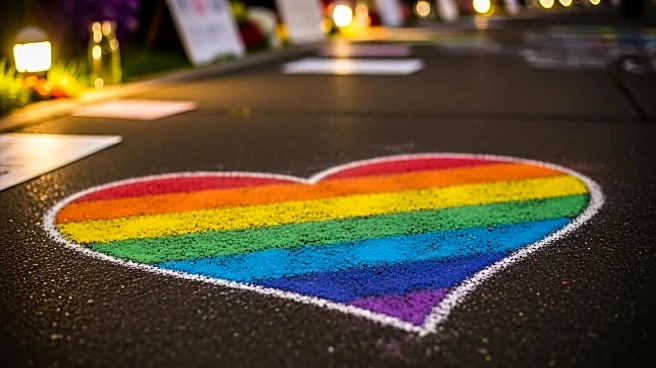What's Happening?
A judge has dismissed charges against Sebastian Suarez, who was arrested for defacing a traffic device during a protest at the Pulse nightclub memorial in Orlando, Florida. The memorial, a rainbow crosswalk, commemorates the victims of the 2016 mass shooting at the LGBTQ nightclub, where 49 people were killed. Suarez, visiting from Georgia, used chalk to leave footprints on the crosswalk, which led to his arrest by the Florida Highway Patrol. The incident is part of a broader cultural conflict involving the Florida Department of Transportation (FDOT), which recently painted over the rainbow sidewalk following new guidelines banning non-standard road markings. Governor Ron DeSantis has supported these actions, stating that state roads should not be used for political purposes.
Why It's Important?
The dismissal of charges against Suarez highlights ongoing tensions between cultural expression and state regulations in Florida. The rainbow crosswalk has become a symbol in the cultural debates involving LGBTQ rights, with actions by FDOT and statements from Governor DeSantis reflecting a broader political stance against such expressions. This situation underscores the challenges faced by LGBTQ communities in advocating for visibility and remembrance in public spaces. The legal and political maneuvers surrounding the memorial could influence public policy and societal attitudes towards LGBTQ rights and cultural symbols in the state.
What's Next?
The ongoing conflict over the Pulse nightclub memorial may lead to further protests and legal challenges as activists continue to advocate for LGBTQ visibility. FDOT's enforcement of new road marking guidelines could face scrutiny and potential opposition from civil rights groups. Political leaders and community organizations may engage in dialogue or legal action to address the implications of these regulations on cultural expression. The situation may also prompt discussions on the balance between state control and community-driven initiatives in public spaces.
Beyond the Headlines
The controversy over the Pulse nightclub memorial raises questions about the intersection of politics, cultural expression, and public space regulations. It highlights the ethical considerations of using public infrastructure for memorials and the potential impact of political decisions on marginalized communities. The case may influence future policies on public art and memorials, as well as the role of government in regulating cultural symbols.








